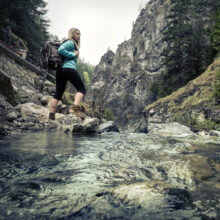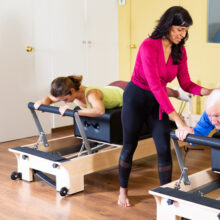Discover the Link Between Exercise and Aging
- Published: Wednesday, February 10th 2016
- in Fitness
By Andrew Wolf, M.S. ED.
 Is there a relationship between how much I exercise and how well I age? The quick and easy answer is YES! But, let’s first start with two simple concepts, aging and detraining. People often confuse the two and this is unfortunate because it makes the aging process often seem like a grim prospect.
Is there a relationship between how much I exercise and how well I age? The quick and easy answer is YES! But, let’s first start with two simple concepts, aging and detraining. People often confuse the two and this is unfortunate because it makes the aging process often seem like a grim prospect.
Aging is the natural process of maturation. With every passing second I am a bit older and certain things change slowly over time. We tend to lose a bit of cardiovascular fitness, we tend to lose muscle and strength, we tend to lose some bone density, and unfortunately most of us gain a bit of weight. The thing to keep in mind about aging is it progresses at a super slow rate. These changes happen at a pace that easily allows us to make adjustments to our living in order to accommodate.
The real fly in the ointment, so to speak, is detraining. Detraining is the accelerated loss of function because of disuse, not misuse. Human beings are meant to move around all the time and when we stop for any length of time, the body allows its systems to atrophy in such a way that it impairs function. If you work hard and do something challenging for three weeks the body realizes you are serious and pays you back by getting better at what you are doing. If you take three weeks off it decides you don’t need the abilities that you used to take for granted so it takes them away. Think about all the three week windows of time that you have been inactive because of work, family, and so on.
This is why I constantly push my Miraval clients to work a bit harder if they can. If I can get a client to do cardio a bit more intensely the body reacts by getting more fit. That greater fitness translates into a better ability to burn calories which affects much more than weight loss. The more calories you burn per workout the less time it takes to prevent a myriad of afflictions. Colon cancer, dementia, coronary artery disease, type two diabetes, post menopausal breast cancer, and hypertension are all diseases that show up less the more you exercise. This is especially important in the context of aging because that calorie burning ability tends to trend downhill as we age. If exercise can maintain this ability, despite age, it can make graceful aging a possibility.
On a similar note if I can get my clients to put down the little weights and pick up something heavier we can do two things. We can put more strain on the skeletal and muscular system creating a better response to weight training as well as making the neurological system send clearer messages to the muscles.
I always say to my clients, “If you can pick it up more than 15 times, your body has probably lost interest already.” I want my clients picking up weights that they can only lift 8-12 times. This kind of resistance gets much more done in less time, as well as having an interesting effect on the linkage between your brain and your muscles.
Try this: flex your bicep as hard as you can and keep flexing it for 30 seconds straight. As much as you think your are flexing 100% in reality only 50% of the muscle is on. When the first 50% gets tired the second 50% takes over so you can keep posing. Now stop flexing because people are starting to stare! When you lift something heavier you are training your body to be able to flex more of the muscle on demand. This is how people without big muscles can manage to pick up amazing amounts of weight. This is also something that goes downhill with age if we do not address it. Exercising with a bit more weight is a way to maintain strength as we age so we do not need help.
Finally, this increase emphasis on quality instead of quantity can also help with the dreaded drop in resting metabolic rate (RMR). Most of the age related drop in RMR can be accounted for by the age related drop in muscle mass. If a little heavier weight can prevent muscle loss it can also slow down the drop in RMR.
You might also like:
Top 10 Weight-Loss Myths, Debunked!
Cardio Workouts: Why It’s Important to Keep Your Heart Rate Up
Fitness Cheat Sheet: Yamuna Body Rolling
Readers’ Choice Awards: Top 10 Best Spas for Fitness
DIY Butt Lift: 5 Workouts to Build Your Best Butt
Earning his Master’s Degree at the Human Performance Lab UT Austin, Andrew Wolf specializes in exercise performance enhancement as well as diabetes treatment and prevention through enhanced metabolic function. Wolf’s expertise can help guests gain a deeper understanding on how their fitness levels may be impeding or aiding in the prevention of some of today’s most common and preventable diseases.


